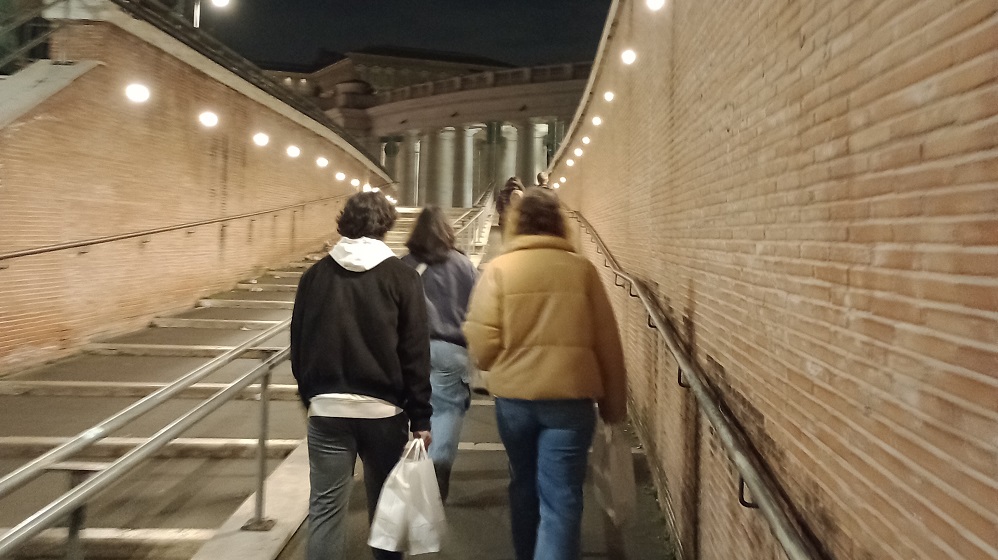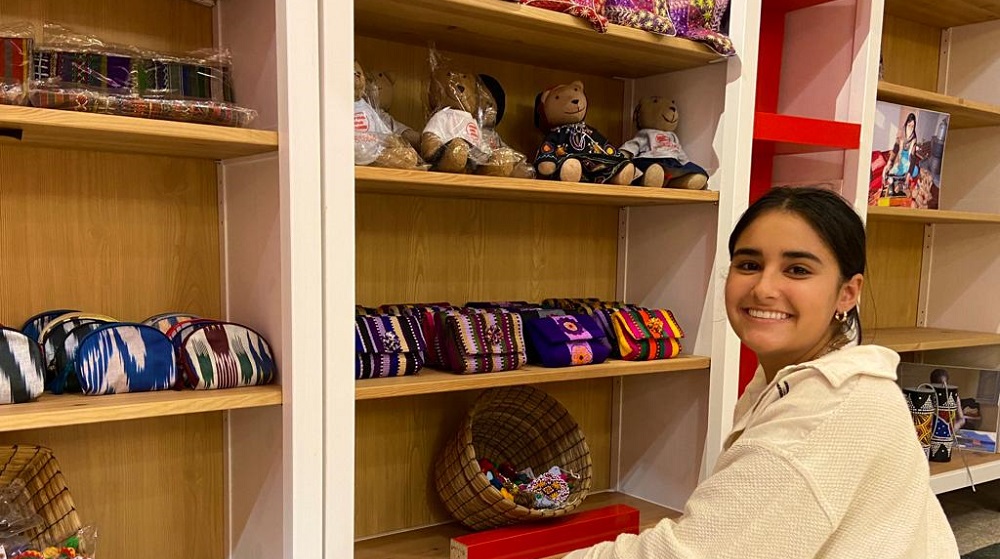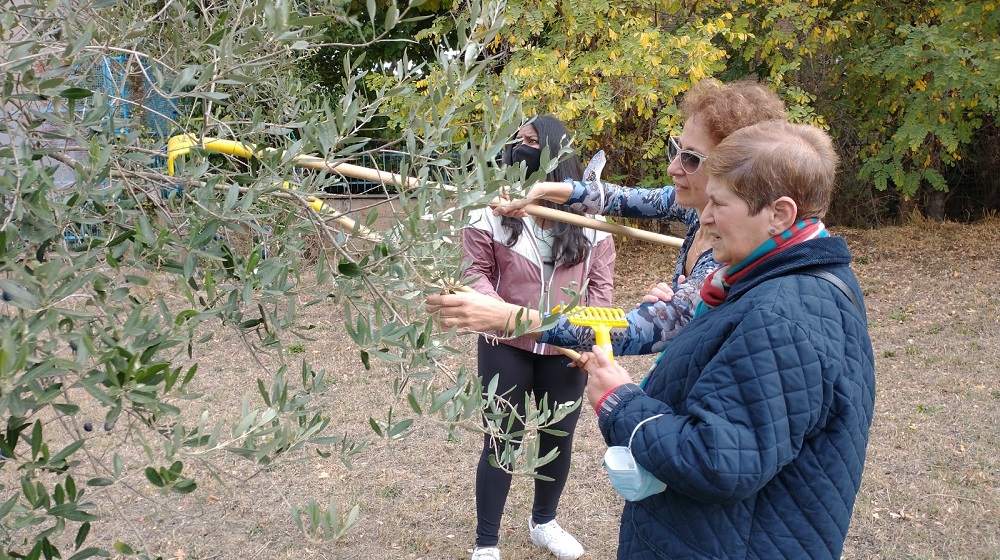
Service Learning
Service-learning is a practical pedagogy that combines community-based service with academic class reflection. Service Learning is deeply connected to LUC’s mission of working to expand knowledge in the service of humanity through learning, justice, and faith.
At LUC (and therefore the Rome Center), Service Learning is one type of Engaged Learning, alongside academic internships, undergraduate research, field work, and public performance. Each one of these Engaged Learning types has different goals, structures, and requirements. Service Learning is connected to specific JFRC courses, which are for credit and combine the students’ service with course-related learning goals. This makes Service Learning different than extracurricular community service/volunteering activities.
What does Service Learning look like in Rome?
All undergraduate students at LUC are required to complete at least one Engaged Learning course prior to graduation. Service Learning at the John Felice Rome Center fulfills the LUC Engaged Learning requirement, but the requirement can also be fulfilled with the Internship course or the Ricci Scholars Program offered in Rome. There are currently service learning components in Rome Studies, Italian, Theology and Anthropology courses. These courses require at least 20 hours of service learning and are structured around at least one Service Learning model (or a mix of them).
Additionally, these courses:
- Emphasize the importance of encounter and reciprocity in addressing service.
- Have specific learning goals connected to community service.
- Merge together community and classroom learning with critical reflection, through assignments and projects.
What kinds of Service Learning experiences are there?
Many. This is because courses structure their Service Learning opportunities in communication with partnering groups and organizations, asking them what their needs at the time are, while also taking into account students’ skills and interests.
Different models of Service Learning are:
- Placement-based Service Learning. Students engage on site with a specific population, collaborating directly with a community-based organization or initiative.
- Project-based Service Learning. Students work together in groups or as a class to produce and deliver a product to a community-based organization.
- Education/advocacy based Service Learning. Students work together to shed light on a social/political issue for the community at large.
- Event-based Service Learning. Students work with a community partner to produce/promote an educational event with wide access.
- Consulting-based Service Learning. Students apply their technical skills, expertise, and interests to support the needs of the partnering organization.
- Community action research-based Service Learning. Students perform research that can be of help to a specific organization/community, setting the research agenda and deciding how results will be used together with community members.
What courses count as Service Learning courses?
You may find an up-to-date list of Service Learning courses at LUC (including the JFRC) here. When registering for courses on LOCUS, all courses that meet Service Learning requirements and are approved as such, are listed on the course catalogue by an “E” following the course number, as all other Engaged Learning courses are.
The JFRC Service Learning courses currently are:
- ROST 382
- ITAL 250
- ITAL 251
- THEO 266
- ANTH 216
What are some examples of Service Learning experiences at the Rome Center?
Although Service Learning experiences change semester-by-semester depending on the needs of partnering organizations and students’ skills and interests, Service Learning opportunities at the JFRC have included:
- On-site help at the Joel Nafuma Refugee Center, including supply room assistance (placementbased).
- Working on a travelling exhibit and on a film festival featuring the work and voices of migrants and refugees with Mediterranean Hope (advocacy/event-based).
- Preparing and delivering food to people that are homeless in the St. Peter’s Square area with Sant’Egidio (placement-based), as well as involvement in food drives (project-based).
- Helping raise awareness on civilian war victims supports by Emergency, through work at their Roman information point (placement-based).
- Engaging with disability culture through encounter and sharing activities with Faith and Light community members with and without intellectual disabilities at local parishes (placementbased) and translation work for Ombre e Luci.
- Assisting/supporting The Clewer Initiative with on-site workshops to equip communities in combating trafficking and exploitation, and sharing critical feedback on pilot workshop (placement/project-based). Also, providing TCI with technical feedback on their multimedia presence (consulting-based).

Theo 266
Church and Global Cultures
Students enrolled in the theology service learning course prepared meals for the unhoused at the Vatican homeless shelter as part of their work with the Sant'Egidio Community. The meals were then distributed around St Peter's Square to those in need.

Ital 250
Italian Composition & Conversation II
Every Christmas, Emergency, a humanitarian organization, holds a Christmas market. Students in "Italian Composition & Conversation II" worked at the information booth, translated the written material into English and helped to organize some of the events.

Rost 382
Human Rights: The View from Rome
The "Hear My Voice" art exhibition featured the work of migrants and refugees in Calabria and Sicily, exploring the reality of exploitation and the hope of freedom. The students from the course helped to launch this initiative on campus.

Theo 266
Church and Global Cultures
This theology class invited the Faith and Light community members with and without intellectual disabilities to participate in the annual olive harvest on campus. Beforehand, the students listened to the community's account of their recent meeting with Pope Francis.
Further questions?
Please contact Dr. Luca Badetti, Service Learning and First Year Experience Coordinator: lbadetti@luc.edu
Service-learning is a practical pedagogy that combines community-based service with academic class reflection. Service Learning is deeply connected to LUC’s mission of working to expand knowledge in the service of humanity through learning, justice, and faith.
At LUC (and therefore the Rome Center), Service Learning is one type of Engaged Learning, alongside academic internships, undergraduate research, field work, and public performance. Each one of these Engaged Learning types has different goals, structures, and requirements. Service Learning is connected to specific JFRC courses, which are for credit and combine the students’ service with course-related learning goals. This makes Service Learning different than extracurricular community service/volunteering activities.
What does Service Learning look like in Rome?
All undergraduate students at LUC are required to complete at least one Engaged Learning course prior to graduation. Service Learning at the John Felice Rome Center fulfills the LUC Engaged Learning requirement, but the requirement can also be fulfilled with the Internship course or the Ricci Scholars Program offered in Rome. There are currently service learning components in Rome Studies, Italian, Theology and Anthropology courses. These courses require at least 20 hours of service learning and are structured around at least one Service Learning model (or a mix of them).
Additionally, these courses:
- Emphasize the importance of encounter and reciprocity in addressing service.
- Have specific learning goals connected to community service.
- Merge together community and classroom learning with critical reflection, through assignments and projects.
Further questions?
Please contact Dr. Luca Badetti, Service Learning and First Year Experience Coordinator: lbadetti@luc.edu
